附录一:英语口语等级考试话题项目表
- 格式:doc
- 大小:168.00 KB
- 文档页数:7
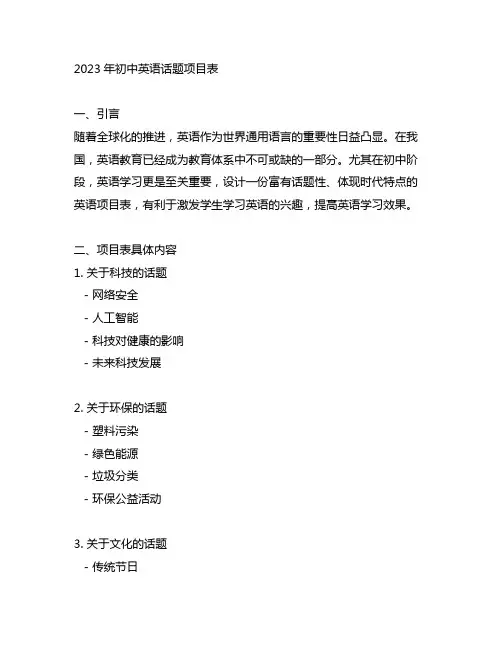
2023年初中英语话题项目表一、引言随着全球化的推进,英语作为世界通用语言的重要性日益凸显。
在我国,英语教育已经成为教育体系中不可或缺的一部分。
尤其在初中阶段,英语学习更是至关重要,设计一份富有话题性、体现时代特点的英语项目表,有利于激发学生学习英语的兴趣,提高英语学习效果。
二、项目表具体内容1. 关于科技的话题- 网络安全- 人工智能- 科技对健康的影响- 未来科技发展2. 关于环保的话题- 塑料污染- 绿色能源- 垃圾分类- 环保公益活动3. 关于文化的话题- 传统节日- 中西文化差异- 流行文化- 文化遗产保护4. 关于教育的话题- 教育公平- 优质教育资源分配- 课外活动- 教育创新5. 关于健康的话题- 饮食健康- 运动习惯- 心理健康- 社会健康问题6. 关于社会现象的话题- 网络侵权- 社交媒体与人际关系- 青少年成长问题- 传媒对社会的影响三、项目表的制定原则和方法1. 充分考虑学生的实际情况和兴趣爱好,确保话题的时代性和接地气。
2. 以培养学生的批判性思维和创造力为目标,选择具有广泛讨论空间和深度挖掘潜力的话题。
3. 采用多种形式的活动设计,例如小组讨论、写作比赛、主题演讲等,以提高学生的综合语言运用能力。
四、项目表的实施与评估1. 实施阶段- 教师根据项目表的话题内容,组织相关课堂活动,如阅读、听力、口语练习等。
- 学生按照项目表的话题开展小组活动,展示团队合作能力和表达能力。
2. 评估阶段- 教师通过学生的表现、作业和项目展示等形式进行综合评估。
- 学生通过自评、互评和教师评价,形成对自己学习成果的客观认识。
五、项目表的实际效果分析1. 提高学生的学习积极性和主动性,培养学生的学习兴趣和学习动力。
2. 大大提高了学生的综合语言运用能力,增强了学生的口头表达和书面表达能力。
3. 培养学生的创新意识和批判性思维,提高学生的文化包容性和社会责任感。
六、结语制定一份富有话题性且符合时代特点的初中英语项目表,可以有效推动学生的英语学习,激发学生的学习兴趣和积极性,提高学生的英语综合能力,为学生的综合发展打下坚实的基础。
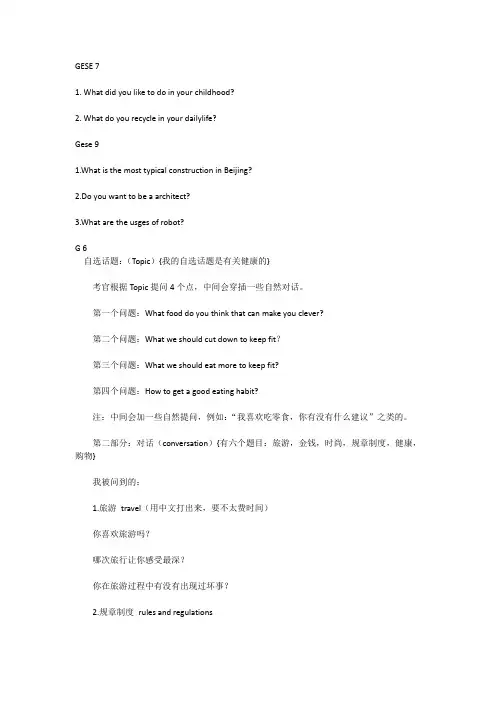
1. What did you like to do in your childhood?2. What do you recycle in your dailylife?Gese 91.What is the most typical construction in Beijing?2.Do you want to be a architect?3.What are the usges of robot?G 6自选话题:(Topic){我的自选话题是有关健康的}考官根据Topic提问4个点,中间会穿插一些自然对话。
第一个问题:What food do you think that can make you clever?第二个问题:What we should cut down to keep fit?第三个问题:What we should eat more to keep fit?第四个问题:How to get a good eating habit?注:中间会加一些自然提问,例如:“我喜欢吃零食,你有没有什么建议”之类的。
第二部分:对话(conversation){有六个题目:旅游,金钱,时尚,规章制度,健康,购物}我被问到的:1.旅游travel(用中文打出来,要不太费时间)你喜欢旅游吗?哪次旅行让你感受最深?你在旅游过程中有没有出现过坏事?2.规章制度rules and regulations2.你喜欢校服吗?3.为什么要穿校服?注:要加两次对考官的自然提问,语速要适中,不能有背诵嫌疑。
最后,祝其它考三一口语的同学取得好成绩!G55级部分真题1.FestivalsWhat’s your favorite Chinese festival? why?What do you do on that day? Who often spend this festival with you? Which festival do you think is most important in china? Why?Tell me the stories of Spring Festival.Do you know anything about Halloween? When is it?2.Car and bicyclesHow do you go to school everyday?Can you ride a bike /drive a car?When did you begin to use it? /how you used it in the past ?Which one do you like more ,car or bicycle?Why do many people like to have a car /bicycle?3.MusicDo you like music? Why or why not?Which do you like ,pop music or classical music ? why ?What is your favorite song ?what is the meaning of the song?When do you usually listen to music?4.BirthdayDo you think that birthday is an important day?How do you celebrate your birthday ?Where do you prefer to celebrate your birthday ,in a restaurant or at home ? Do you know your mother’s birthday?What do you do to celebrat e your parents’ birthday ?5.EntertainmentDo you like going to the cinema?How often do you go to the cinema ? why?Who is your favorite movie star ?why ?G61.TravelingHow long will the trip take?How did you go?Who did you go with?Were there anything interesting /funny on the way?Have you experienced any special food or customs?What things impressed you the most?3.ClothWhat kind of cloth do you like?Do you think the color of cloth is important?5.Health三一口语四级话题1. What did you do on last Christmas?2. What is your plan for next year's Christmas party?3. Do you like shopping? Where do you usually go for shopping?4. What do you usually buy?5. Did you go to any places of interest last year?6. Between Beijing and Hangzhou, which do you prefer?三一口语五级话题1.What's your weekend activity?2.What did you do last weekend?3.Can you play any instruments? When did you start to learn it?4.What's your hobby? Why do you like it?5.Is this the 1st time that you have been to Pinggu?6.Which places did you visit? Is there anything that impresses you a lot?7.How many times have you been to Hainan?8.Did you live in the local family or the hotel?9.What's the difference between local family and hotel?10.Between train and plane, which do you prefer to use for traveling?11.Now many families have got cars. Why do they buy cars?12.Does your family have a car? When did you buy it? Why?13.Is it good or bad that the students of the same age study and learn together?Healthy and FitnessQ:How can you keep fit according to your own experience?Q: how to keep fit?When I was born, I was much bigger than other babies. But I didn’t grow up as a fat boy. I don’t like to eat too much sweet food and I do exercises. I go to swimming class twice a week. I jump rope and play basketball when I have free time.Q: For modern people, mental health is as important as physical health. What are you going to do to maintain your mental health?Yes, because the work stress and competition, modern people not only have physical problems, but also mental problems. I don’t have work stress, but I have lots of homework and competition in English and mathematics. I want to find a balance between my study and free time. In my free time, I would like to play with my friends, watch TV and read Mickey magazines. All of these make me feel happy and relaxed.Q: Do you think you have a healthy diet?Yes, I think I have a healthy diet. I eat freshly made food every day. I take fresh fruit and yoghurt every day as well. I don’t like to have too much meat and sweet food. I drink water instead of soda.Q: Are there many hospitals where you live?Yes, there are many hospitals in Beijing. Many hospitals are very famous so people from all over the country come here to get treatment. Some hospitals are specialized, for example in traditional Chinese medication, or for dental problems. I usually go t o the Children’s hospital when I’m sick.Q: What kinds of exercise do you think are the best for your health?Different people need different exercises. I think swimming is best for my health. First, I like swimming, so I go twice a week. Second, it’s a full body exercise. You get exercise from your head to your ankles. Third, it’s an exercise suitable for the whole year since there are lots of indoor swimming pools. I also like to jump rope, ski and skate. I can jump rope whenever I have several minutes of free time. It’s good for my bones. Skiing and skating are good for my balanc e and they are fun.Q: How are you feeling today?Thank you, I’m feeling very well.Q: Young men get up late while old men get up early, which one is better?I think young men get up late because they go to bed late and need more sleep than old men. Old men usually go to bed early and don’t need much sleep. For kids like me, it’s better to go to bed before 10 o’clock because our bodies need enough rest to keep healthy. In China, we have to get up early on school days. We are asked to arrive in the classroom before 7:40. High school student need to go to school earlier. So, it’s better to go to bed early and get up early. But it’s crazy to get up too early like my grandparents. They get up at 5 o’clock in the morning.Q: Would you like to exercise outdoor?Yes, it’s fun to exercise outdoor with fresh air. I like to jump rope, play basketball and ride the bicycle. Sometimes I go skiing in winter. I climb mountains in Spring and Autumn.。

英语口语能力测试话题(清晰版-22个话题全)英语口语能力测试话题讨论补充材料Topic1:Talking about your major一、词汇:Department of Chinese Language and Literature 中文系Art Department 美术系Politics and Law Department 政法系Music Department 音乐系Education Department 教育系Department of Math and Information Technology 数学与信息技术系Physics and Electronic Engineering Department 物理电子工程系Department of Chemistry 化学系Biology Department 生物系Department of Physical Education 体育系Department of Tourism Management 旅游管理系Foreign Language Department 外语系literature: 文学,文学作品; 〔古语〕学识,学问;Higher education 高等教育educational background 教育程度educational history 学历bachelor degree 学士学位degree 学位doctor (Ph.D) 博士master 硕士bachelor 学士post doctorate 博士后graduate student研究生graduate 毕业生undergraduate 大学肄业生Undergraduate (尚未取得学位)大学生abroad student 留学生returned student 回国留学生foreign student 外国学生intern 实习生freshman 大学一年级学生sophomore 大学二年级学生;高中一年级学生Junior 大学三年级学生;高中二年级学生senior 大学四年级学生;高中三年级学生discipline 学科liberal arts 文科current major 目前专业occupation 职业specific专门的career生涯Engineer 工程师industries工业,勤劳medical science 医学education 教育economics 经济curriculum 课程major 主修minor 副修educational highlights 课程重点部分curriculum included 课程包括specialized courses 专门课程courses taken 所学课程courses completed 所学课程refresher course 进修课程physical activities 体育活动recreational activities 娱乐活动academic activities 学术活动social activities 社会活动rewards 奖励scholarship 奖学金Management 管理contribute 奉献potential 潜能opportunity 机会pursue 追逐secure安心的;不必担心的;有把握的Achieve达到(目的),实现Well-prepared 充分准备appreciate 欣赏二、短语:1. build…upon…. 把……建立于….上2. as a matter of fact = in fact 事实上,实际上3. with regards to regarding to 关于,至于4.not only…..but also…. 不仅….而且….. 5.according to my major 根据我的专业6.be keen on sth. /doing sth. 喜欢做某事7.feel sick doing sth/dislike……讨厌做某事8.tend to be……趋向于成为…….9. give (full) play to (your potential) 充分发挥你的优势10.in addition 另外三、句子:1、What’s your major?你学什么专业的?2、My major is…/ I major in…我的专业是…3、It is useful/ practical. 这个实用。
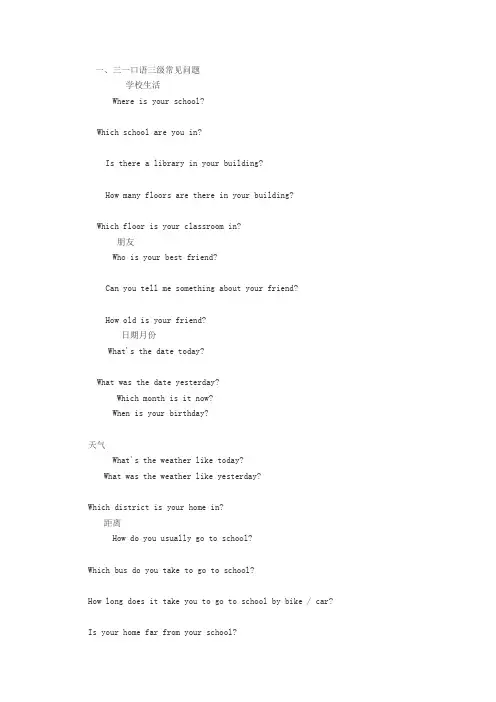
一、三一口语三级常见问题学校生活Where is your school?Which school are you in?Is there a library in your building?How many floors are there in your building?Which floor is your classroom in?朋友Who is your best friend?Can you tell me something about your friend?How old is your friend?日期月份What's the date today?What was the date yesterday?Which month is it now?When is your birthday?天气What's the weather like today?What was the weather like yesterday?Which district is your home in?距离How do you usually go to school?Which bus do you take to go to school?How long does it take you to go to school by bike / car? Is your home far from your school?How far is it from your home to school?描述所做的活动What were you doing at this time yesterday?Do you play basketball?Who do you often play with?What do you do on school playground in winter?What do you often do in your spare time二、三一口语四级常见问题周末活动What do you often do on weekendsWhat did you do yesterday?What will you do tomorrow?What did you do yesterday?What are you going to do this afternoon?What do you like to do on the internet?What do you often play in the park?食物What's your favorite food?What did you eat last supper?When did you go to eat KFC/Macdonald's last time?学习和工作What about your English teacher?What's your favorite book?Which is your first book you read?How is your school life?商店购物What do you often buy when you go shopping?When do you go shopping?Who do you go shopping with?How often do you go shopping?Where do you often go shopping?What kind of goods for you often buy?Do you like going shopping?Is there any interest when you go shopping?What's the difference between shopping center and supermarkets?What do you think is the best shop in your mind?爱好与体育运动What's your hobby?What's your favorite sport?Who taught you?Where did you learn it?What's your parents' favorite sport?How often do you play football?Which book did you read yesterday?Where did you buy it ?Do you like playing computer games? why?假日Where did you go last summer holiday?What did you do last summer holiday?What did the place look like?How did you go there?What's your favorite holiday?What do people do on this holiday?When is Christmas Eve?What do you think of Christmas?What's the difference between Christmas and Spring Festival?what do you often do in Spring Festival?三、三一口语五级常见问题音乐When do you listen to the music?How often do you listen to the music?Who is your favorite star?Why do you like him/her?What instrument can you play?What kind of music do you like best?What's your feeling when playing …?Why do so many people like Jay Zhou?Why is Jay so famous?Do you know something about Peking Opera?Do you like listening to music?What's your favourite teacher?What's your favourite music, singer? And why?娱乐When do you watch TV?What kind of movies is bad for children?What's your favorite TV program?汽车与自行车How do you go to school?Do you like a car or a bike?What is the advantage and disadvantage of the cars and bikes?Do you ride bikes to school?Is it safe to ride bikes?Can you ride bikes? Do you want to learn it?What do you take to go to school in winter?When did you learn to ride bikes?Did you learn it by yourself or someone taught you?What are you going to do when you grow up?Do you often exercise?Do you often have bad dreams at night?What do you think about the traffic in Beijng?Could you tell me some traffic problems in Beijing?How to solve these problems?How to avoid the traffic jam?Can you predict the future traffic?节日What do you often do in Tomb -sweeping Festival?What do you eat in Spring Festival?What do you do at the night in Spring Festival?How do you celebrate Christmas?What's your favorite festival?What festival do you like best?Do you know about some traditional festivals in China?What is the most important festival in China?How to celebrate Mid-Autumn Day?Do you know about some festivals in western country?庆祝活动Who do you like to celebrate your birthday with?Why don't you like to celebrate birthday with your parents?Do you like to celebrate your birthday alone or with other people?Do Chinese people eat dumplings in foreign countries in Spring Festiva l?If there are no coins in dumplings, will you eat it?How to celebrate your birthday?Do you like to decorate your room? How to decorate it?个人最近发生的事What do you do in your spare time?Do you have any classes on weekend?What subject do you like best?How many classes do you have?四、三一口语六级常见问题旅行How many places have you ever been?Which place is the most impressive one?Have you ever been to some places out of Beijing?Which kind of city do you prefer to visit, modern or historic?What's your plan for traveling next time?购物How often do you go shopping?Do you usually go shopping with your mother or father?What do you like to buy?Do you prefer to buy something online or at department store?You are a primary school student. What do you think of fashion?服饰Should we go after fashion or not?Can we wear earring at school?If a student is not fashionable, other people don't like to make frien ds with him/her. What do you think of this fact?钱币Do you like saving money?Some parents always give much money to their children. What's your opi nion on the subject?Some primary school students hold mobile phone at school. What's your opinion on it?Do you have red-envelope money in Spring Festival? How to spend your r ed-envelope money?规章制度What do you think about the rules in your class?Do you know some traffic reles? How to obey these rules?What rules do you need to obey when you're in a car?What do you think about the safety belt?健康How can you keep fit according to your own experience?What kinds of exercise do you think are the best for your health?Would you like to exercise outdoor?1.Do you think most people in China abide by the law?I think it is true that many people in China abide by the law.This is because the penalty for breaking a law,even for a petty offence,is very harsh.2.Do you think it's important for people to obey laws?I think that it is important for people to obey ws are made to keep the society in order,so if all people obey the laws,the society will be a much more peacedul place to live in.3.What benefit are there for society when people obey laws?When people obey laws,the society at large can be assured that when they go out,they will not be attacked or robbed.There will be a sense of security and trust in the society and this is good for the whole society.4.Many people think that occasional, minor breaches of the law is ok?When people think in this way,it is because the punishment for minor offences is too lenient.For example,nobody will be sent to jail for throwing a stone at somebody's window.This mindset is wrong.A breach of law,no matter how occasional,how minor,is still a breach of law and people should not think it is okay to breach the law when the punishment is light.5.Do people in China like the police?Generally people in China have a kind of respect mixed with awe towards the police.Whhen the police help them,the people respect them.But when the police are doing something whcih the people disagree with,then the people will hate the police.It all depends on whether what the police do harms the people's self interests.6.What does the society need more police or lawers?这个问题应该是why吧The society does need more police or lawers because our society is so large and diverse that it is difficult to assume that all people will be obedient and behave themselves.Therefore police and lawers are needed to ensure that whoever breaches the law is punished while those who obey the law are protected.7.Why do you think some people want to work as lawyers?Many people are attracted to the career of a lawyer because a lawyer's pay is several times higher than an ordianry office worker.Moreover,lawers are generally respected and have high social status as they are seen to be doing good for the society.8.What do you think is the reason for having laws?Laws are made to safeguard the interestes the society in large and to punish those who hram other people in order to gain more benefits for themselves. 9.What would the society be like id there were no laws?In an ideal world,no laws are needed beuase everybody knows how to behave.However,in this real world,a society without laws would be chaotic and unlivable because people would try to do everything,be it robbery or extortion,to gain more advantages for themselves.10.Do you think it's suitable to have exactly the same laws for every country? It is definitely not suitable for every country to have exactly the same laws.For one thing,different countries are governed by different groups of people whose opinions on what is good for their people differ verymuch.Secondly,laws are sometimes made to suit the local culture.Since different places have different traditions and cultures,it will not be suitabel to enforce the same set of laws on every country.For example,Western countries like the United States make it illegal for a man for marry two women at the same time while in most Muslim countries such as Saudia Arabia it iscommon and not against the law for a Muslim man to marry more than one woman.。
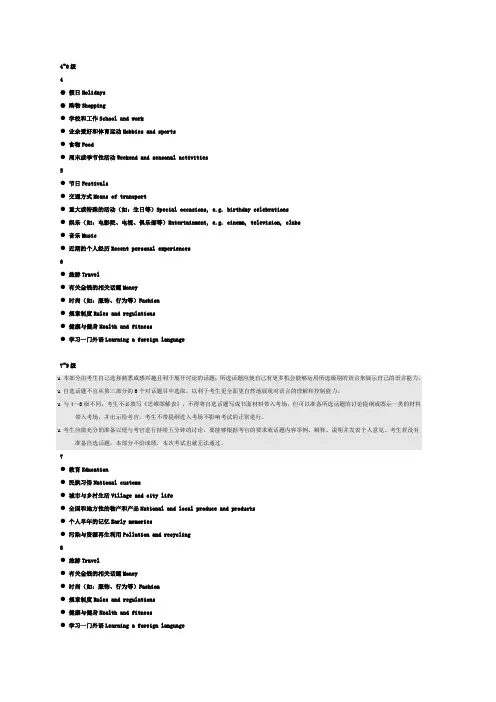
4~6级4●假日Holidays●购物Shopping●学校和工作School and work●业余爱好和体育运动Hobbies and sports●食物Food●周末或季节性活动Weekend and seasonal activities5●节日Festivals●交通方式Means of transport●重大或特殊的活动(如:生日等)Special occasions, e.g. birthday celebrations●娱乐(如:电影院、电视、俱乐部等)Entertainment, e.g. cinema, television, clubs●音乐Music●近期的个人经历Recent personal experiences6●旅游Travel●有关金钱的相关话题Money●时尚(如:服饰、行为等)Fashion●规章制度Rules and regulations●健康与健身Health and fitness●学习一门外语Learning a foreign language7~9级u本部分由考生自己选择熟悉或感兴趣且利于展开讨论的话题;所选话题应使自己有更多机会能够运用所选级别的语言来展示自己的语言能力。
u自选话题不宜从第三部分的6个对话题目中选取,以利于考生更全面更自然地展现对语言的理解和控制能力。
u与4~6级不同,考生不必填写《思维图解表》,不得将自选话题写成书面材料带入考场,但可以准备所选话题的讨论提纲或图示一类的材料带入考场,并出示给考官。
考生不带提纲进入考场不影响考试的正常进行。
u考生应做充分的准备以便与考官进行持续五分钟的讨论,要能够根据考官的要求就话题内容举例、解释、说明并发表个人意见。
考生若没有准备自选话题,本部分不给成绩,本次考试也就无法通过。
7●教育Education●民族习俗National customs●城市与乡村生活Village and city life●全国和地方性的物产和产品National and local produce and products●个人早年的记忆Early memories●污染与资源再生利用Pollution and recycling8●旅游Travel●有关金钱的相关话题Money●时尚(如:服饰、行为等)Fashion●规章制度Rules and regulations●健康与健身Health and fitness●学习一门外语Learning a foreign language9●梦和梦魇Dreams and nightmares●犯罪和惩罚Crime and punishment●技术Technology●习惯和对事物的迷恋Habits and obsessions●全球环境问题Global environmental issues●设计(如:服装、建筑、汽车、家具等)Design10~12级第一部分:自选话题陈述(约5分钟)u考生的自选话题要求内容完整、语篇连贯、要点突出。
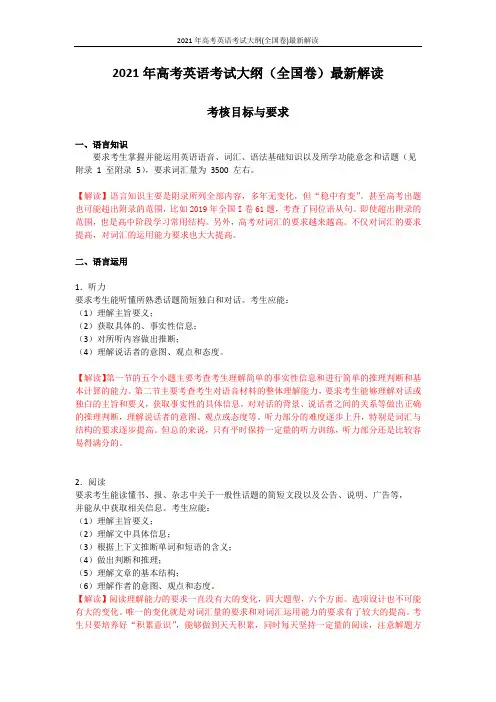
2021年高考英语考试大纲(全国卷)最新解读考核目标与要求一、语言知识要求考生掌握并能运用英语语音、词汇、语法基础知识以及所学功能意念和话题(见附录1 至附录5),要求词汇量为3500 左右。
【解读】语言知识主要是附录所列全部内容,多年无变化,但“稳中有变”。
甚至高考出题也可能超出附录的范围,比如2019年全国I卷61题,考查了同位语从句。
即使超出附录的范围,也是高中阶段学习常用结构。
另外,高考对词汇的要求越来越高。
不仅对词汇的要求提高,对词汇的运用能力要求也大大提高。
二、语言运用1.听力要求考生能听懂所熟悉话题简短独白和对话。
考生应能:(1)理解主旨要义;(2)获取具体的、事实性信息;(3)对所听内容做出推断;(4)理解说话者的意图、观点和态度。
【解读】第一节的五个小题主要考查考生理解简单的事实性信息和进行简单的推理判断和基本计算的能力。
第二节主要考查考生对语音材料的整体理解能力,要求考生能够理解对话或独白的主旨和要义,获取事实性的具体信息,对对话的背景、说话者之间的关系等做出正确的推理判断,理解说话者的意图、观点或态度等。
听力部分的难度逐步上升,特别是词汇与结构的要求逐步提高。
但总的来说,只有平时保持一定量的听力训练,听力部分还是比较容易得满分的。
2.阅读要求考生能读懂书、报、杂志中关于一般性话题的简短文段以及公告、说明、广告等,并能从中获取相关信息。
考生应能:(1)理解主旨要义;(2)理解文中具体信息;(3)根据上下文推断单词和短语的含义;(4)做出判断和推理;(5)理解文章的基本结构;(6)理解作者的意图、观点和态度。
【解读】阅读理解能力的要求一直没有大的变化,四大题型,六个方面。
选项设计也不可能有大的变化。
唯一的变化就是对词汇量的要求和对词汇运用能力的要求有了较大的提高。
考生只要培养好“积累意识”,能够做到天天积累,同时每天坚持一定量的阅读,注意解题方法的培养,阅读理解部分就容易得高分。
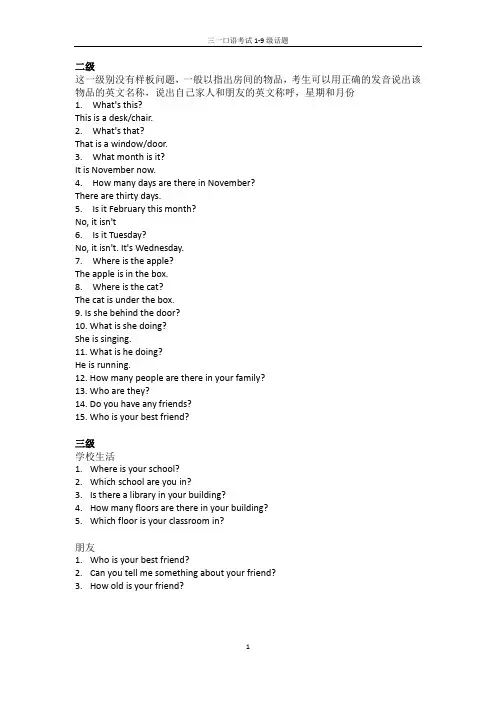
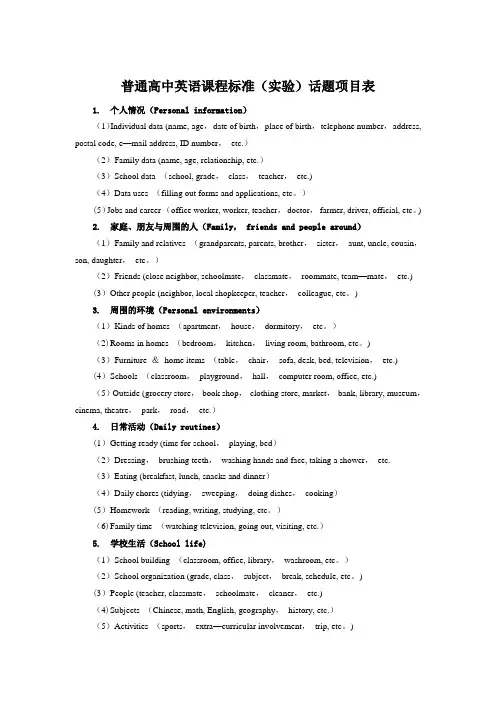
普通高中英语课程标准(实验)话题项目表1.个人情况(Personal information)(1)Individual data (name, age,date of birth,place of birth,telephone number,address, postal code, e—mail address, ID number,etc.)(2)Family data (name, age, relationship, etc.)(3)School data (school, grade,class,teacher,etc.)(4)Data uses (filling out forms and applications, etc。
)(5)Jobs and career (office worker, worker, teacher,doctor,farmer, driver, official, etc。
)2.家庭、朋友与周围的人(Family, friends and people around)(1)Family and relatives (grandparents, parents, brother,sister,aunt, uncle, cousin,son, daughter,etc。
)(2)Friends (close neighbor, schoolmate,classmate,roommate, team—mate,etc.) (3)Other people (neighbor, local shopkeeper, teacher,colleague, etc。
)3.周围的环境(Personal environments)(1)Kinds of homes (apartment,house,dormitory,etc。
)(2)Rooms in homes (bedroom,kitchen,living room, bathroom, etc。
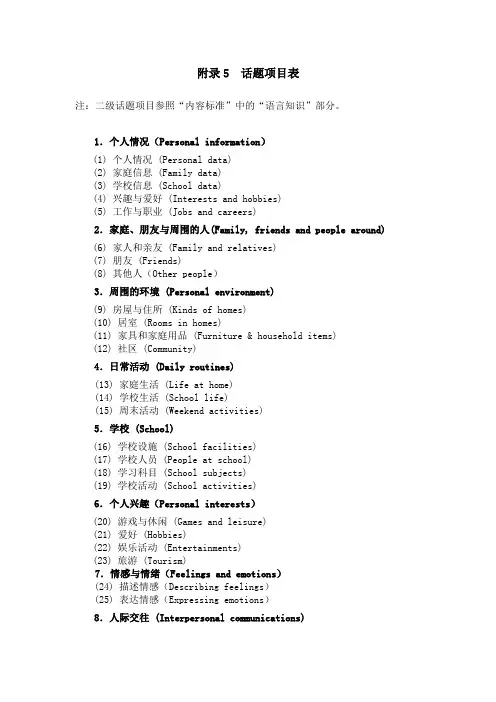
附录5 话题项目表注:二级话题项目参照“内容标准”中的“语言知识”部分。
1.个人情况(Personal information)(1) 个人情况 (Personal data)(2) 家庭信息 (Family data)(3) 学校信息 (School data)(4) 兴趣与爱好 (Interests and hobbies)(5) 工作与职业 (Jobs and careers)2.家庭、朋友与周围的人(Family, friends and people around)(6) 家人和亲友 (Family and relatives)(7) 朋友 (Friends)(8) 其他人(Other people)3.周围的环境 (Personal environment)(9) 房屋与住所 (Kinds of homes)(10) 居室 (Rooms in homes)(11) 家具和家庭用品 (Furniture & household items)(12) 社区 (Community)4.日常活动 (Daily routines)(13) 家庭生活 (Life at home)(14) 学校生活 (School life)(15) 周末活动 (Weekend activities)5.学校 (School)(16) 学校设施 (School facilities)(17) 学校人员 (People at school)(18) 学习科目 (School subjects)(19) 学校活动 (School activities)6.个人兴趣(Personal interests)(20) 游戏与休闲 (Games and leisure)(21) 爱好 (Hobbies)(22) 娱乐活动 (Entertainments)(23) 旅游 (Tourism)7.情感与情绪(Feelings and emotions)(24) 描述情感(Describing feelings)(25) 表达情感(Expressing emotions)8.人际交往 (Interpersonal communications)(26) 社会行为 (Social behaviours)(27) 合作与交流(Cooperation and communication)9.计划与安排(Plans and arrangements)(28) 计划 (Planning)(29) 安排 (Arranging)10.节假日活动(Festivals, holidays and celebrations)(30) 节日与假日(Festivals and holidays)(31) 个人庆典 (Personal celebrations)11.购物 (Shopping)(32) 计划(Planning)(33) 商品(Products)(34) 选择(Selecting)(35) 付款(Paying)(36) 个人喜好(Personal preference)12.饮食 (Food and drink )(37) 食物(Food)(38) 饮料(Drinks)(39) 饮食习俗(Eating customs)(40) 点餐 (Ordering food and drink)13.卫生与健康(Hygiene and health)(41) 身体部位(Parts of body)(42) 体育健身 (Physical fitness and exercise)(43) 个人卫生(Personal hygiene)(44) 疾病(Illnesses)(45) 健康饮食 (Health diet)(46) 医疗 (Medical care)14.安全与救护(Safety and first aid)(47) 安全守则 (Safety rules)(48) 意外 (Accidents)(49) 急救 (First aid)(50) 自我保护 (Self protection)15. 天气 (Weather)(51) 描述天气情况 (Describing weather)(52) 天气预报 (Weather report)(53) 衣着与天气 (Dressing for the weather)16.文娱与体育 (Recreation and sports)(54) 电影与戏剧 (Movies and theatre)(55) 音乐与舞蹈 (Music and dance)(56) 体育与赛事 (Sports and matches)17.旅游与交通 (Travel and transport)(57) 旅行 (Travel)(58) 交通运输方式 (Modes of transportation)(59) 问路 (Asking the way)(60) 交通标志 (Road signs)(61) 使用地图 (Reading maps)18.通讯(Communications)(62) 写信 (Writing letters)(63) 打电话 (Making phone calls)(64) 使用互联网 (Using the Internet)19. 语言学习( Language learning)(65) 语言学习经历 (Language learning experiences)(66) 语言与文化 (Language and culture)(67) 语言学习的策略 (Language learning strategies)(68) 体态语 (Body language)20.自然(Nature)(69) 动物和植物(Animals and plants)(70) 山川与河流 (Mountains and rivers)(71) 季节 (Seasons)(72) 宇宙(Universe)(73) 人与自然 (Man and naure)21.世界与环境(The world and the environment)(74) 国家与民族 (Countries and nationalities)(75) 环境保护 (Environmental protection)(76) 人口 (Population)22.科普知识与现代技术(Popular science and modern technology)(77) 数字与数据 (Numbers and data)(78) 科普知识 (Popular science)(79) 发明与技术 (Inventions and technological advances)(80) 信息技术 (Information technology)23.历史与社会(History and society)(81) 中国历史与世界历史 (History of China and the world)(82) 著名人物 (Famous people)24.故事与诗歌(Stories and poems)(83) 故事 (Stories)(84) 诗歌 (Poems)(85) 短剧 (Short plays)(86) 作家 (Writers)。
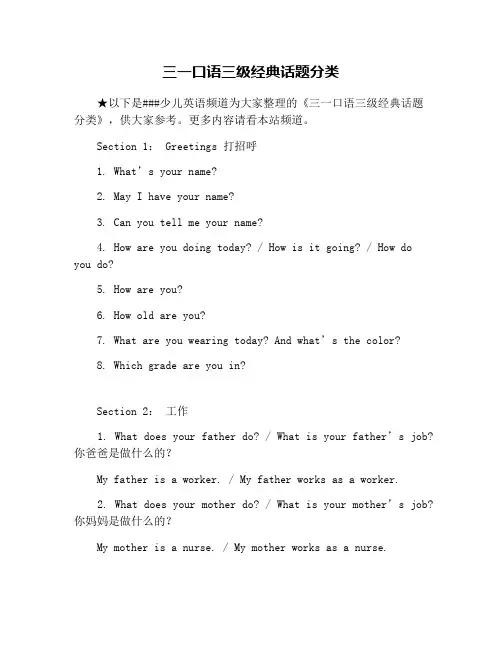
三一口语三级经典话题分类★以下是###少儿英语频道为大家整理的《三一口语三级经典话题分类》,供大家参考。
更多内容请看本站频道。
Section 1: Greetings 打招呼1. What’s your name?2. May I have your name?3. Can you tell me your name?4. How are you doing today? / How is it going? / How do you do?5. How are you?6. How old are you?7. What are you wearing today? And what’s the color?8. Which grade are you in?Section 2:工作1. What does your father do? / What is your father’s job? 你爸爸是做什么的?My father is a worker. / My father works as a worker.2. What does your mother do? / What is your mother’s job? 你妈妈是做什么的?My mother is a nurse. / My mother works as a nurse.3. What do your parents do? / What are your parents’ jobs? 你的父母是做什么的?They’re workers. / They work as workers.4. Is your mother a teacher? 你的妈妈是老师吗?No, she isn’t. / Yes, she is.5. Is your father a teacher? 你的爸爸是老师吗?Section 3:学习场所1. Where do you live? 你住在哪?I live in…2. Is your home far from here? 你家离这远吗?Yes, it is. / No, it isn’t.3. Where do you study? 你在哪上学?I study at…school.4. Tell me about your school. 给我说说你的学校。
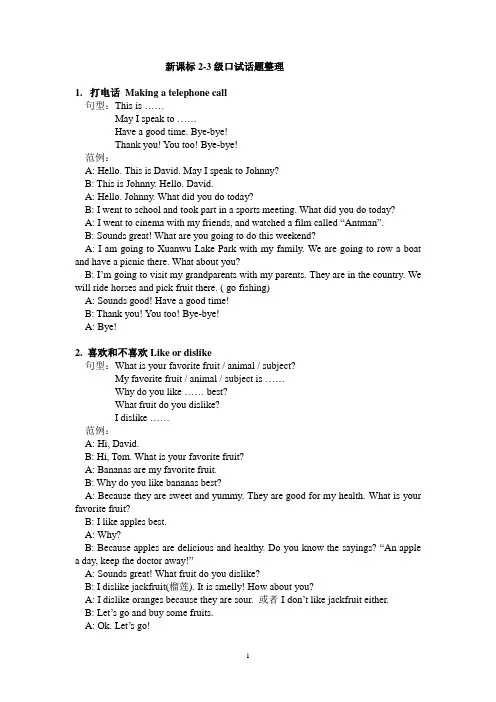
新课标2-3级口试话题整理1.打电话Making a telephone call句型:This is ……May I speak to ……Have a good time. Bye-bye!Thank you! You too! Bye-bye!范例:A: Hello. This is David. May I speak to Johnny?B: This is Johnny. Hello. David.A: Hello. Johnny. What did you do today?B: I went to school and took part in a sports meeting. What did you do today?A: I went to cinema with my friends, and watched a film called “Antman”.B: Sounds great! What are you going to do this weekend?A: I am going to Xuanwu Lake Park with my family. We are going to row a boat and have a picnic there. What about you?B: I’m going to visit my grandparents with my parents. They are in the country. We will ride horses and pick fruit there. ( go fishing)A: Sounds good! Have a good time!B: Thank you! You too! Bye-bye!A: Bye!2. 喜欢和不喜欢Like or dislike句型:What is your favorite fruit / animal / subject?My favorite fruit / animal / subject is ……Why do you like …… best?What fruit do you dislike?I dislike ……范例:A: Hi, David.B: Hi, Tom. What is your favorite fruit?A: Bananas are my favorite fruit.B: Why do you like bananas best?A: Because they are sweet and yummy. They are good for my health. What is your favorite fruit?B: I like apples best.A: Why?B: Because apples are delicious and healthy. Do you know the sayings? “An apple a day, keep the doctor away!”A: Sounds great! What fruit do you dislike?B: I dislike jackfruit(榴莲). It is smelly! How about you?A: I dislike oranges because they are sour. 或者I don’t like jackfruit either.B: Let’s go and buy some fruits.A: Ok. Let’s go!3. 朋友和家人句型:How many people are there in your family?There are…… people in my family. My dad, my mum … and I.What does your mother/father do?Who is your best friend?My best friend is ……范例:A: How many people are there in your family?B: There are 3 people in my family. My dad, my mum and I.A: What does your mother do?B: My mum is a teacher. She likes listening to music and she usually cooks delicious food for us. I love her. What does your mother do?A: My mum is a doctor. She likes reading and she is good at playing chess. I often play chess with her.B: Sounds nice. Who is your best friend?A: Antony is my best friend. He is short and thin. I am taller than him. But he runs faster than me. He likes drawing pictures and playing the piano. I like to play football with him. Who is your best friend?B: My best friend is Amy. She is tall and pretty. She is good at swimming. I often swim with her. We both like reading. We are close friends!A: I am glad to hear that.4. 天气Talk about the weather句型:What will the weather be like tomorrow?It will be sunny / cloudy / windy.What are you going to do tomorrow?I am going to ……?范例:A: What will the weather be like tomorrow?B: It will be cloudy first, but clear soon.A: Are you sure?B: Yes. What are you going to do tomorrow?A: I’ll go to a farm and pick fruit with my parents. How about you?B: I’ll go to cinema with my friends. We are going to watch a film called “Antman”.A: Sounds good. What will the weather be like this weekend?B: It will be snowy. What will you do?A: If it snows I’ll make a snowman and play a snow fight with my friends.B: Can I join you?A: Sure, welcome!B: Thank you!5. 运动Sports句型:What is your favorite sport?I like swimming / playing basketball.范例:A: Did you have your sports day?B: Yes. Yesterday.A: What did you do at the sports day?B: I took part in a basketball match. Our team did well in the basketball match.A: Congratulations!B: Thank you! What is your favorite sport?A: I like running and long jump. What is your favorite sport?B: I like swimming best. I swim twice a week.A: Sounds good! When do you have your sports day?B: Next week.A: Good luck!B: Thank you! Bye-bye!A: Bye-bye!6. 在餐馆in the restaurant句型:What would you like?I’d like……Would you like …… ?Yes, please! No, thank you!范例:A: What would you like to eat, Sir?B: I’d like a glass of orange juice and a vegetable salad.A: Ok. Would you like a hamburger?B: No, thank you. I’d like a pizza.A: What kind of pizza do you want?B: A pizza with bacon and tomato. I don’t like pepper. Please don’t put any pepper on it.A: Ok. Would you like any dessert after dinner?B: Sure. I’d like an ice-cream.A: A strawberry ice-cream or a chocolate ice-cream?B: Chocolate, please!A: Ok. Please wait a minute.B: Thank you.7. 旅行travelling句型:What are you going to do this winter holiday?I’m going to travel with ……Where are you going to travel?We are going to travel ……?范例:A: What are you going to do this winter holiday?B: I’m going to travel with my family.A: Sounds great! Where are you going to travel?B: We are going to visit Beijing.A: That must be fun. Beijing is the largest city in China. I like Beijing.B: Me too. We’ll visit lots of interesting places in Beijing. We’ll climb the Great Wall and visit the Summer Palace. What are you going to do this winter holiday?A: I am going to travel with my friends.B: Cool! Where are you going to travel?A: We are going to visit Xi’an.B: Great. Xi’an was the capital city of Tang Dynasty. There are many places of interests.A: Yes. We plan to see Terra-cotta warriors(兵马俑). They are fantastic.B: Awesome! Have a good time!A: Thank you!8. 在学校in the school句型:How many classes do you have today?What lessons?What is your favorite subject?范例:A: How many classes do you have today?B: Six.A: What lessons?B: Chinese, Maths, Computer Studies, Science, PE and Art.A: When do you have your English class?B: On Monday, Wednesday and Friday.A: Do you like English?B: Yes, of course. I think English is very interesting and useful. If I learn English well, I can speak English with foreign people when I travel abroad.A: Yes. You are right. I like English too.B: What is your favorite subject?A: I like Computer Study best.B: Why?A: Because I think computers are very important in our life. If I learn how to use computer, I can send e-mails to my friends and shop on line.B: Sounds great.9. 建议Suggestions句型:What can I do?范例:A: I’m hungry now. What can I do?B: Eat an apple.A: But I want to eat a cake.B: There is no cake at home.A: I want to make a cake by myself. Can you teach me?B: Sure. First of all, mix the flour, sugar, butter and milk together into a thick mixture.A: And then?B: Second, put the mixture into the cake tin. Third, put the tin into the oven. And set the oven to 200°c. Bake it for 20 minutes.A: Sounds easy!B: Yes. Finally, put your favorite fruit on it.A: Thank you. I think I can make a cake now.B: Let’s wait and see.10. 谈论周末talk about your weekends套用第一条,打电话11. 问路Asking the way句型:How can I get there?Which is the way to the ……?范例:A: Excuse me! I am going to the Zhonghua Primary School. But I lost my way. How can I get there?B: Go straight along the street. And turn left at the first corner. Then you will see the school.A: Thank you very much! By the way, which is the way to the nearest supermarket?I want to buy some fruits.B: Turn right at the first corner. You’ll see it on the opposite of the road.A: Thank you. It is very kind of you! Bye-bye!B: Bye-bye!12. 看医生seeing the doctor句型:What’s the matter with you?What’s wrong with you?How do you feel now?范例:A: What’s the matter with you?B: I have a toothache.A: How come? What did you eat?B: I ate too many sweets. And I didn’t brush my teeth.A: Oh. It is a bad habit to eat too many sweets. Let me clean your teeth first.B: Ok. Thank you!……(做洗牙动作)A: How do you feel now? Do your teeth still ache?B: I feel much better. My teeth don’t ache now.A: Good. Remember not to eat too many sweets and brush your teeth twice a day. B: Ok. I’ll remember your advise. Bye-bye!A: Bye-bye!13. 购物Shopping句型:What would you like?I’d like……Would you like …… ?范例:A: This supermarket is so big! I want to buy some fruits here.B: What would you like, David?A: I’d like some bananas and apples. Apples are my favorite.B: Ok. Would you like some juice?A: Yes. I like orange juice best.B: Me too. I’d like two cartons of orange juice.A: Great! How much are these?B: 20 yuan. Would you like anything else?A: Oh, I want to eat an ice-cream. I am hot.B: Ok. How about the chocolate ice-cream. Chocolate is my favorite.A: Me too. Let’s go and find them.14. 四季Four seasons句型:Which season do you like best?I like……best.Do you like …… ?Yes, I do! No, I don’t!范例:A: Which season do you like best, David?B: I like winter best.A: Why? Winter is too cold.B: Because I like going skiing and skating. If it snows, I can make a snowman and play a snow fight with my friends. Besides, my birthday is in winter. Christmas day is in winter too. I can get a lot of gifts.A: Sound great! I like Christmas day too.B: Which season do you like best, Amy?A: I like summer best because I like swimming. I can go to the seaside and swim in the sea in summer. Also I like wearing beautiful skirts in summer.B: Summer is great. I like eating ice-creams in summer.A: Me too!15. 动物Animals句型:What is your favorite animal?I like…… best.Why ?范例:A: Hi, Tom. Do you know what animal is the biggest in the world?B: Let me guess. Elephant?A: No. The biggest animal in the world is blue whale. A blue whale is as long as half of a football field.B: Wow! Sounds cool! What is your favorite animal?A: I like dogs best. Dogs are very cute. You know I was born in the year of dog. And I like eating bones, just like a dog. What is your favorite animal?B: I like monkeys best.A: Why?B: Monkeys are very clever. They can do many tricks. They like eating bananas. I like bananas too.A: You are clever too!B: Haha. Thank you!。
三一口语考试1-9级级别要求、话题样表一、三一口语考试简介伦敦三一口语证书是目前最火爆的口语水平测试证书,它以其权威性、实用性、系统性成为重点中学所青睐的英语口语能力证明之一。
重点中学最终看重的其实还是孩子“运用知识的能力”。
这表现在小升初综合素质考查的英语测试方面,毫无疑问就是英语的听、说、读、写能力。
就此看来,重点中学所看重的三一口语显然是对学生英语能力的一个考验与客观反映。
什么样的学生将会在以后的学习上更具有潜力?基于此类问题,重点中学似乎年年都在思索,而这种思索又直接导致择优选拔策略上的变更与改进。
在重点中学择优高压下,部分学生对英语的学习过程中难免会出现只为应试过关,不顾能力提升的现象。
那么如何在优中选优?这样,重点中学对优秀学生的选拔就自然又多出了个“英语口语测试”。
一目了然,三一口语等级考试的本身就是对考生听说能力的一项考核,所以,其被重点中学所看重自然也在情理之中。
三一英语口语等级考试的主要目的是考核考生的听说能力。
它的主要功能和作用是检验应考者的听说能力。
三一口语所面向的群体也是英语爱好者。
这类考试并无需考生花费很多的时间去备考,考生只要知道考试的方法,准备几分钟的自主话题就可以。
三一口语话题主要考查考生对一事物的理解能力和英语表达能力。
这是考查英语实际应用能力的考试,考生不但要有大量的词汇基础,还要有宽泛的知识面,重点中学重视的恰恰又是学生英语的运用能力。
1、GESE考试介绍共分4个层次,12个级别,即:预备级1-3级;初级4-6级;中级7-9级;高级10-12级。
各级考试都采用考生和考官一对一面试方式,级别越高,对话时间就越长。
GESE1-6级考试的考官由中方考官担任,7-12级考试考官由英方考官担任。
2.考试体系1)考试时间根据人数和报名单位需要而定2)考试后两个月即可向通过考试的考生颁发证书3)考试全程录音。
4)考试成功率高3.证书含金量GESE是北京市政府与英国伦敦三一学院合办的一个考试体系。
大学英语口语测试话题总表一级格式:1. topic2. ideas for discussion (expressed in statements or questions)3. related words and expressions1.my hometown2.my family (father/mother/brother/sister)3.my favorite books and films4.generation gap5.Olympics 20086.learning English7. College life8. our university9. our class10. my dormitory and roommates2级格式:1. topic2. ideas for discussion (expressed in statements or questions)3. related words and expressions1.Money2.Ideal Job3.Boyfriend/Girlfriend4.Advertisements5.Olympics 20086. Cheating in Exams7. Star-worship8. Pets9. Western and Chinese films10. Chinese festivals and western festivals3级格式:1. topic2. ideas for discussion (expressed in statements or questions)3. related words and expressions1.Traveling2.environment protection3.certificate craze4.private cars in China5.bicycles in China6.7.8.9.10.4级格式:1. topic2. ideas for discussion (expressed in statements or questions)3. related words and expressions1. Education in China2. Part-time Job3. Pollution4. Population5. Hobbies6. Smoking7. Internet8. Mobile phone9. Sports10. Shopping Habits一级Band one1. generation gapIdeas for discussion:What is generation gap? Can you cite examples to show generation gap in our lives?What do you think of generation gap? Is it a good thing or bad thing?How to deal with generation gap?Do you think it is possible to get rid of generation gap?Why there is generation gap all the time?related words and expressionsfail communication false message distance contradiction ignore opposite ideas principles beliefs attitudes towards life cultural norms control radical conservative favorite music habit dressing style manners books movies games cultural values traditional opera living/educational environment outlook of the world information knowledge experience science technique society development invention tradition habit custom avoid conflicts seek understanding pu t your feet into other’s boots respect other’s choice catch up with social progress peer outlet emotion mature exchange ideas friendship between generations2. College LifeQuestions for discussionYou are going to talk about your college life. Read the following questions and discuss them with your partner.1. Do you enjoy your college life? Why?2. Say something about the first day when you came to the college.3. What do you do in your spare time?4. Do you have any part-time jobs? What do you think about part-time job?5. What do you think of your dormitory, satisfied or disappointed?6. What kind of characteristic do you think is important in your college life?Language focusHere are some useful sentences and structures that you might find handy in discussing the above questions:I enjoy my college life very much / do not like my college. Because I think the campus is beautiful and facilities are wonderful. Studying in college is a brand start of our life. / Because this is not my ideal college, I do not belong here.Time flies. Recalling about the past one year, so many thoughts are flooding in my mind.When first day I came to University, I really feel that the school is very good.In my spare time, I usually play badminton / tennis / pole jump (撑杆跳高) / skating / bowling / rock climbing.I often go to the library / computer rooms.I do part-time job on weekends.I’m delivering sample products / doing market research for a company / selling papers and magazines at a newsstand every Sunday afternoon.The most important thing, I think, is to get some work experience. Pay is secondary.I like our campus, there are so many trees and tall buildings, but at the first sight of the dormitory, something disappointing come up to me! The condition of the dormitory is really very poor with only one room, no lavatory!I like my dormitory very much. It is big enough and I have 6 wonderful roommates.During my college life, I’ve found that it is hard for people who lack necessary skills / are too picky to find satisfactory work.I think having enough knowledge / being confident / honest / enthusiastic is more important. I have learnt such3. Education in ChinaTopics for discussion:1. Introduction of primary school in China2. Introduction of junior middle school in China3. Introduction of senior middle school in China4. Introduction of higher education in China: entrance examination, fees, quality education, problems5. Introduction of adult education in ChinaLanguage focus:I. six years of primary school1. beginning school at 62. compulsory educationII. three years of junior middle school1. compulsory educationIII. three years of senior middle school1. working very hard in order to be enrolled by colleges or universities2. taking part in college entrance examination3. severe competition between candidatesIV. higher education1. good result in college entrance examination2. college fees and tuitionsa. getting a part-time jobb. getting a scholarship from the universityc. applying to a bank for a loan, pay back after graduation3. quality education at collegesa. more than just book knowledgeb. cultivating students with good characterc. broadening the students’ knowledged. developing their capacitiese. providing them with opportunities to develop all potential gifts4. problemsa. low enrollment rateb. poor quality of teaching facilitiesc. not easy for the students to find a job after graduationd. lack of social experiences, book knowledge onlye. some promising students may lose their chance of higher education because of poverty5. suggested solutionsa. lower the scores needed to enter collegeb. increase enrollment ratec. set up private collegesd. increase the investmente. introducing advanced teaching methodsf. learning from the success of other countriesV. adult education1. require another degree or diploma2. getting more knowledge3. more qualified for better jobs and quicker promotion4. vocational schools:a. eager for new skills,b. be qualified for the job in trade, administration, teaching or other services4. Our UniversityQuestions for discussion1. Where is your school? Do you like your school’s surroundings?2. How many students/undergraduates/postgraduates/teachers are there in your school? How manydepartments/majors are there in your school? what are they ? Do you like your major? Why or Why not? What is your hope for your department and your major?3. What has impressed/moved you most in your school life? Besides your major courses, do you select any optional courses?4. Do you often go to your school’s library? What do you like doing there? If you like reading there, what do you usually read? Why?5. There are many statues in your school. Do you know about them? Which one do you like most?Why?6. What do you like to do in your spare time? Have you joined any clubs in your school? Why orwhy not? Do you often go to attend the lectures /concerts held in your school? Do you like them? Why? What kind of sports do you like to do in your spare time?Language Focusfounded in 1951, renamed Xi’an Shiyou University in 2003, located in the southern part/suburb of Xi’an. beautiful trees and flowers , birds, 2 high-rising teaching buildings, science laboratories, modern language laboratories, computer learning center and modern multi-media classrooms, an excellent place for learning.approximately 15,000 students/undergraduates , 500 postgraduates, over 100 overseas students from South Korea, the Republic of Kazakhstan, staff, about 1500, 12 colleges and 3 departments, 48 majors, the school of Petroleum Engineering, the school of Mechanical Engineering, the school of Electronic Engineering, the school of Economic Management, the school of Humanities, the school of Science, the school of Computer Science, the school of Continuing Education, the school of Engineering & Business, the school of Chemistry and Chemical Engineering, the Department of Resources Engineering, the Department of Material Science and Engineering, the Department of Foreign Languages, the Department of Music, the Department of PhysicalEducation, and the Department of Postgraduates. I major in/My major is…I like my major very much because.. make contribution to our country’s petroleum industry.. I hope we can conduct more field practices to have more clear knowledge of the field work...What has impressed me most is hard-working and highly professional teachers/beautiful surroundings/colorful school life….I often go to the library to read all kinds of books-- technical books/novels/specialized books/magazines—to improve/enlarge my knowledge about/gain insight into…/broaden my horizon…Our school provides many optional courses /minors for us to choose from…: English minors, psychology, photography, business management…There are s everal statues on the school’s campus: the Statue of Wang Jinxi, the Statue of Tang Chunyu, the Torch … I like the Statue of Wang Jinxi, which reminds me of the history of Chinese Petroleum industry….I have joined the English Club. We organize some spoken contests/English corner every term to motivate other students to improve their English… I will go to every lecture since I can broaden my horizon/learn something about the development of the petroleum industry/my specialty…I also go to every concert held in the school because I can enjoy/get relaxed/have my temperament molded/cultivated… Besides learning, I take part in a lot of sports activities: football, basketball, volleyball, tennis, table tennis, swimming, skating, judo, aerobics (健美操),physical dance (体育舞蹈)—Latin dance-- , bodybuilding…5. Olympics 20081. Ideas for discussionThe origin of OlympicsWhat are the Olympic spirits?Why are Olympic Games so attractive?Name some of the most popular Olympic eventsThe significance of Olympics 2008 for ChinaThe possible problems which might be caused by Olympics 2008 in Beijing2. Related words and phrasesChinese Olympic Committee, athlete, sportsman, coach, home team, visiting team, national team, referee, host nation flame-lighting ceremony, opening ceremony, closing ceremony, team event, individual event, men’s event, women’s event, finals, quarter-finals, semi-finals, in good (top, super) form, to keep (hold) a record, to break a record, to equal a record, spectator, sportsmanship, sports field (ground), sports center, gold (silver, bronze) medal, stadium, gymnasium, track events, field events, high jump, long jump, 100m dash, hurdles, long distance race, starting line, finishing line, gymnastics, swimming, diving, football, basketball, volleyball, table tennis, tennis, badminton,Other useful informationOn 23 June, 1894, Coubertin founded the International Olympic Committee.In 1896, the first Olympic Games of the modern era were held in AthensThe Olympic Rings --- the union between men,The Beijing 2008 Olympic Games emblem“Chinese Seal, Dancing Beijing” is filled with Beijing’s hospitality and hopes, and carries the city’s commitment to the world.The Official Mascots --- Fuwa embody the natural characteristics of four of China’s most popular animals -- the Fish, the Panda, the Tibetan Antelope, the Swallow -- and the Olympic Flame. Theme Slogan --- “One World One Dream” expresses the common wishes of people all over the world, inspired by the Olympic ideals, to strive for a bright future of Mankind. In spite of the differences in colors, languages and races, we share the charm and joy of the Olympic Games, and together we seek for the ideal of Mankind for peace.The Olympic Motto--- “Faster, Higher, Stronger”. The most important thing is not to win but to take part!二级Band Two1.MoneyMoney is everything, become rich, happiness will naturally follow, a happy family life, get what you want, house, car , even love, enjoy delicious food, do what you like, good education, health, travel, entertainment, leisure; root of all evils, dishonest means to get money, piracy, cheating, stealing, robbing, drug trafficking, smuggling, kidnapping, blackmail, bribery, even murder; money is not the answer to all problems, money is a very good thing, can’t do anything without money in this society. Necessary for people. But my opinion, we should just have the money we need indeed, an Angel and also a damn, make you succeed or fail immediately. So treat it in a right way. With money you can buy a house but not a home ; buy a clock ,but not time ; buy a bed but not sleep ; can buy a book ,but not knowledge...So can buy whatever you want ,but not feel happy ,because not buy substance of life .2.Ideal JobMost people have their ideal jobs because of different interests, abilities or goals, working in a big company, full of challenges; doctor, relieve patients from their pains; policeman, fight against and eliminate crimes, keep people safe, help people in trouble; teachers, likes to study, likes to stay with students to stay young mentally, impart knowledge, long vacation; actors/actress/movie stars, TV/radio show host /hostess, talk show host/variety show host, musician, earn more money and be famous; air hostess, high pay and travel around the world, gain insight into another culture; businessman, challenges, successful and rich; reporters, reflect social problems, report latest news; photographer, record and keep the beautiful and valuable things through camera; model, high pay, try on all kinds of beautiful dresses, show her/his own glamour; financial adviser, help other people manage their money, more income; lawyer, maintain social justice; technicians, solve problems in production; dietitian, give advice on a healthy and balanced diet…My ideal job is……3.Boyfriend/GirlfriendMany people are strongly against making boyfriends / girlfriends on campus: influence feelings/mood because of too much focus on each other’s interaction with other boys or girls, interfere with study, increase in expense—thus heavy financial burden on parents, less participation in class activities, cohabit, pregnant, do harm to both feeling and body…say goodbyeafter graduation…Other people think it acceptable that students have boyfriends/girlfriends: comparatively pure, romantic and happy that you are together, get rid of the feeling of loneliness , help and encourage each other,In my opinion, …4.AdvertisementsAdvertisements can be seen everywhere: television, radio, magazine street, difficult to resist the attraction of colorful advertisements; a lot to be said in favor of advertisements: provide information, a lot of activities and institutions receive financial support through advertising, provide entertainment, gain artistic enjoyment, the slogans are witty, the situations are funny; misleading, encourage people to buy what they do not need, be cheated by false advertisement, should be alert for the deceptive words of advertisement, be interrupted by commercials when watching , but whether like or not, part of our life.5.the Olympics Games/OlympicsThe Olympic Games…every four years in a different city in the world, an international sports event, Athletes …compete in a variety of sports: track and field events – high jump, long jump, discus throwing, javelin throwing, 100-metre run, relay race; football, volleyball, basketball, badminton, table tennis; swimming, diving, gymnastics…. Winter Olympic Games and summer Olympic Games. The Olympic Games take place in the first year of a four-year period known as an Olympiad. began in Greece more than 2 700 years ago. The first recorded Olympic competition … in 776 B. C. , in an outdoor stadium and about forty thousand people watched the event. The first thirteen Olympics …only one race:running. The games had been held regularly for about 1200 years. Then, in the year 397 the Olympics were prohibited by the Roman Emperor. It was not until 1896 that the first Olympics of modern times were held in Athens. From then on the games are held every four years regularly. The Olympics have become the worlds most important athletic events and a symbol of sporting friendship of all the people of the world. The first Winter Olympic Games …in 1924The Games of the 29th Olympiad in 2008 are awarded to the city of Beijing. The International Olympic Committee selected the Chinese capital as the 2008 host in 2001 vote during Juan Antonio Samaranch last IOC session as president. Beijing defeated four other bidding cities, including Toronto and Paris, to secure the country’s first-ever Olympics. Osaka was the first city to go out, and it only took one more round for Beijing to win the Olympic race. The announcement, read out by the 81-year-old Samaranch, was answered with wild joy from the Chinese delegation in Moscow, and with fireworks in Beijing. Beijing stage a great Olympic Games, promise to host a Green Olympics, a Hi-tech Olympics and the People’s Olympics. The Chinese government has pledged to spend 20 billion U.S. dollars building sports complexes and improving the Beijing infrastructure.Be ijing, the capital of China, a history of over 3, 000 years… many places of historic interest in Beijing. Now a big modem city and displayed its new look to the world. During the past 20 years, Beijing has changed a lot. People in Beijing love sports and take an active part in sports…trying their best to prepare for the 2008 Olympic Games…will be held successfully.6. Cheating in Exams1) What kind of cheating methods do students usually take in exams?2) In your opinion, what’s the effect of cheating on ex ams?3) What kinds of suggestions can you give to stop cheating on exams?4) What kind of academic evaluation you value most? Why?5) Do you believe hard work will be rewarded with high marks?Language FocusCopy from each others / take out textbooks or reference books to copy / copy from small pieces of paper prepared for the exam / use the modern communication tool / BP / mobile phone / cell phone to cheat on examsIt results in an unfair competition / will destroy the creativity of those bright / brilliant / top studentsIt will ruin the students’ self-confidence / make students’ self-confidence lost in the long run Society needs honest people / people who have the real academic knowledge /The students who cheat on exams will not be the one who can meet the need of societyA severe punishment should be put into effect / carried out / implemented to prevent students from cheatingGreat effort should be made to make students understand what kind of people does society need / society needs honest people who have the real talentsThe academic evaluation I prefer / value is exams / study performanceExams enable / can make students find / clearly know / their deficiency in the knowledge / subjects they learnedStudy performance can reflect the true level students have in their study / the result of one exam means nothingYes, I believe. No pains, no gainsNo, I don’t. I studied English very hard / I am so committed to learning English, but I can not get high marks in exams7 .Star-worship1) What is star-worship?2) What kind of people can be called an “idol” to others? What do they do?3) Are you an idolater or fan of someone? What do fans usually do?4) Who is your favorite star? In which way does he or she attract you?5) How do superstars influence you in your daily life?6) What is your opinion about the “media”? Do you think it plays an important role in “star-worship”? Why or why not?7) How do stars influence the society? Do you think it is good?Language FocusThere are a lot of fans and idolaters blindly and fanatically admire and or even worship superstars. Most of the fans are young people with immature minds. It's easy for them to go to extremes.Fans seem to be quite fascinated by movie and television celebrities, fashion models, professional athletes, and even comic book and cartoon characters.Superstars are always celebrated for their wealth and glamour rather than their achievements and moral strength of character.Fans who worshipped Beckham engrave Beckham's name on the face, and also some spent 300 Yuan to make a small Beckham's hairstyle, or ask for his autograph and always pays special attention on his trifles collected by paparazzos.The commercialized entertainment circle has produced shining and attractive stars for fans. The mass media has exaggerated the glory and social influence of stars. ~~Influenced by media reports, some young fans indulge in their distorted love toward stars and sometimes go to excessive extremes.More and more people to step onto imitate star's path, they imitate star's attire and the appearance constantly, and even some weird manners and languages.The vogue superstars represent the fashion front, so some use their social influence of their own image and bring the very great well-knowingness and enough sales volume to the product, the business have obtained huge commercial profit, promote the social economy's development. Greatness must be prepared and Rome was not built in a day. No one can succeed for nothing. Success --including the success of popular stars, is always the result of hard work and sacrifice. 8. PetsQuestions for discussion1) Do you like pets? Why?2) Are you keeping pet(s) at your home now? What is it / are they?3) If you don’t have a pet, what kind of animal(s) would you like to choose as your pet?4) What attracts you to choose it (them)?5) What are the advantages to have a pet/ pets?6) What are the disadvantages?Language focusHere are some useful sentences and structures that you might find handy in discussing the above questions:I like / love / am interested in pets very much. They are people’s friends.I don’t like / am crazy about pets. They are noisy.Yes, I have / My family owns pets, for example, a dog / a cat / a parrot / a tortoise / several fishes / a rabbit.I really like dogs / cats / birds / fishes, so I will keep one if I got the chance.I think dogs are very loyal to human / cats are clever and cute / birds sing beautiful / fishes are quiet and colorful.I think that pets are our friends.We will have fun when we play with pets and look after them.A good relationship between people and pets can be very comfortable.Dogs could keep the house safely / Cats would catch mice.Companionship is another reason for keeping pets.Pets can bring us happiness.Children will learn to concern for others, foster their love of nature/ animals, sense of responsibility.Old people may feel lonely & isolated after retired, pets will relieve their loneliness and isolation. But pets sometimes are dangerous.Sometimes, pets might damage the environment.Most pets are dirty and they have a lot of diseases with them which will make us ill.Pets shed (掉毛) everywhere, this is a burden to housewife.9. Western and Chinese filmsWhen did color film come into being?How many kinds of films are there? What are they?Comparing former films and modern high-tech films, which kind do you like better and why? Which films do you think are worth watching? Why? Will you please introduce the brief of them? Can you tell a Chinese film which leaves you the deepest impression? Why it impresses you so much?Why do young people like to watch western films?What do you think is the biggest difference between Chinese films and western films? Language focusMore commercial cinemas will be opened in big cities. In Beijing, for example, the number of cinema theaters will increase by 26 to 100 by the end of 2007.Digital cinemas with smaller screens will be established in medium-sized cities. "Lower ticket prices will attract people in these places to the digital cinemas," said Han.Those in rural areas use to watch films for free, in accordance with government policy. But film companies have not shown much interest in nonprofit projects. In the future, each film shown in a rural area will feature 10-minute ads, which is expected to change corporate attitudes.Many of Chinese films have no plots or story lines nowadays. The directors have lost patience to tell a complete story, and they call this fashion. Some so-called grand works (Dapian) cost tens of millions of RMB to be made, but it seems to common audience that they are only aimed to excite the director himself. Among these, Wuji, directed by Chen Kaige is a typical example.10. Chinese festivals and western festivals1) Can you find some common things / similarities between Chinese festivals and westernfestivals?2) Do you think culture has some influences on their festivals?3) Which festivals would you prefer to observe nowadays—Chinese festivals or western festivals?Why?4) Which western festival is the most popular one in China, according to your opinion? Why?( List out the reasons why it is popular.)5) Do you think it’s good or bad for youth in China to celebrate some western festivals? Why?6) List out some western festivals. Can you say something about their customs?Language Focus:1) There are many / few things in common between Chinese festivals and western festivals.2) Culture really has a great impact / influence on its festivals.3) Family reunion is given much attention in both Chinese festivals and western festivals.4) I prefer observing Chinese / western festivals to western / Chinese festivals.5) Christmas, esp. Christmas Eve attracts more attention in China nowadays.6) Valentine’s Day is my favorite western festival bec ause it is very romantic and full of roses and chocolate.7) From my point of view, it is / isn’t a good phenomenon for youth in China to celebrate western festivals.8) Celebration of western festivals in China means a lot in enlarging cross-culture communications.三级Band Three1. Traveling1. Ideas for discussionDifferent purposes of travelingWhat are the benefits of traveling?Different ways of travelingWhat are the possible problems you may meet with while traveling,?What are the places do you like to go? Why?Services provided for tourists2. Related words and phrasestour, trip, journey, travel agency, travel by sea (by land, by air), tourist, tourism, sightseeing, place of historical interest, scenic spot, summer resort, tourist attractions, tourist guide, transport, destination, airport, port, passport, visa, customs, one-way ticket, round-way ticket, domestic flight, international flight, baggage, duty-free shop, accommodation, hotel, single room, double room, suite, restaurant, Chinese food, western food, local flavor, scenery, landscape,四级Band Four1. Learning Englishmany difficulties; but most rewarding exercises; be active in class; answer questions eagerly; listen to the teacher attentively; practice more after class; speak English whenever possible; make full use of spare time; try to get every opportunity to start conversations with foreigners; listen to records; listen to English broadcasting over radio; online learning also helpful; learn the value of hard work; gain more social experiences; give them insight of other culture; promote friendship2. Part-time JobCollege students; part-time jobs; private tutors; salesmen; waitress; shop assistance; both advantages and disadvantages; interfere with their study; unable to concentrate their minds; fall asleep in class; do not have enough time to finish their homework; fail in examinations; unhealthy interest in money and personal profit; become selfish; earn money to support themselves; help gain social experiences; reduce the parents financial burden; demonstrate their ability; put what they have learned from books into practice; helpful to their future career; my opinion; provide students with more chances of social interaction; keep a balance between study and the job3. PollutionA serious problem; air pollution; noise pollution; water pollution; trees, crops are destroyed; fish die of poisonous water; respiratory disease; problems in hearing ability; release of harmful substances into the environment; too many private cars, factories and the use of insecticides; release polluted water into rivers; destroy ozone layer; cause greenhouse effect;。
英语口语等级考试三级考试大纲(2018年修订版)湖北省英语口语等级考试(Spoken English Testing System / SETS)(三级),自2004年实施以来得到了广大考生和社会的普遍认可与赞同。
但是,随着时间的推移以及考生英语口语能力的提高,一些深层次的问题,如评价的精细化、计算机辅助测试等问题逐渐显现出来。
现在对湖北省英语口语考试大纲第三级的修订,就是为了解决这些问题进行的一次有意义的尝试和努力。
一、水平描述本级别要求考生掌握2400左右的词汇,能在一般性交谈中比较清楚地发表意见,表明态度,作出判断等;能使用常见的会话技巧,能通过提问和应答来了解和传递所需信息;能就一般话题作约2分钟的连续表达;其能力相当于我国全日制高级中学毕业的英语口语水平。
二、考试目标通过本级别所规定的考试方式检验考生是否具有本级别所描述的英语口语水平。
三、考试内容考试内容主要包括本级别话题所涉及的词汇、交际项目、会话技巧等。
(1)话题:参见《附录一:英语口语等级考试话题项目表》中相应级别的话题;(2)交际项目:参见《附录二:英语口语等级考试交际项目表》中相应级别的功能与意念;(3)会话技巧:参见《附录三:英语口语等级考试会话技巧项目表》中相应级别的会话技巧;(4)词汇:参见《附录四:英语口语等级考试1-6级词汇表》中相应级别的词汇。
四、考试方式本级考试形式为计算机辅助考试,每位考生使用一台计算机。
考试时间约20分钟。
考试分为四节:第一节为“短文朗读”,要求考生朗读计算机屏幕上显示的英语短文,其中准备时间为1分钟,朗读的录音时间为1分半钟;第二节为“情景提问”,要求考生根据计算机的提示(如语音、文字、图片、图表、录像等)进行提问,提问的录音时间约1分半钟;第三节为“情景应答”,要求考生根据计算机的提示(如语音、文字、图片、图表、录像等)对计算机所提出的问题进行回答,回答问题的录音时间约1分半钟;第四节为“连续表达”,要求考生根据计算机的提示(如语音、文字、图片、图表、录像等)进行口头的连续表达,其中准备时间为1分钟,连续表达的录音时间为2分钟。
附录一:英语口语等级考试话题项目表说明:、表中的“级别”指考试内容中次话题的适用级别。
、表中的“例子”中的例子包括所标注级别范围中可能出现的内容。
、本话题项目表参考了年月的全日制义务教育“英语课程标准”(修订稿)附录二:英语口语等级考试交际项目表说明:. 本表中的级别(如-级)与本考试的级别相对应。
. 本表参照了《全日制义务教育英语课程标准》、年版《大学英语教案大纲》和年《大学英语教案大纲》(修订版)。
. 寒暄与社会交往 ( )()问候() 级例如:.!!.??...!!.' ., , ?, ....()介绍() 级例如:..' .' England.. . .' .?.!?() .()告辞或告别( ) 级例如:...........()致谢或感谢( ) 级例如:.( )...' ...' .' .' ..' .()道歉() 级例如:..' ., ..' . ' .' () ' .' .' ..' .' ..' .' ..!’. ()邀请() 级例如:.?.??...' , ., ' .., .' , .' , ' .' '. ?()请求允许( ) 级例如:.????.., .... ' ., ., .' , ' .' . ' .' .' , .()祝贺与祝愿( ) 级例如:.!!!!!!!.!!!.., ..()提供帮助( ) 级例如:.????.., ., ..() ., ..' , . ()约会( ) 级例如:.?????' .?' . .., ' .. .' ., ' . ' . () 打电话( ) 级例如:.! ?! ' . .?, .?' .' ..! ., ?, ., ., ' ?. ' .?. ' ..' ., ' .() 就餐( ) 级例如:.?( )??., ?, ?., ' .' ., .?' . .. ., . ' .' , .' , ' . ()就医( ) 级例如:.' ???' ..' .?....' .' ..' .' .()购物() 级例如:.?????' ..' .??' ., ' .?, .' . ' .., ' .() 问路( ) 级例如:.. ' ??. World Park? . ?. , ?. ?.' .' ...' .. .' . ?. ' . ' .()谈论天气( ) 级例如:.' ?' Beijing?!' ..' .' .()语言交际困难( ) 级例如:?? ' . , ' ., ?' .' ., ? , ??... ?, ?' .()提醒注意( ) 级例如:!!!' !' ..!!' !!()劝告() 级例如:' ..., ' .' . .() 提议和建议( ) 级提议()例如:???.?建议()例如:.’() .' .?' ??() 接受和拒绝( ) 级接受例如:.’..例如:, ..’, …. 态度 ()() 同意和不同意( ) 级同意()例如:.....' ., .,.' .不同意()例如:.' .' ....' .’’.’.’.’, ’’ , ’()喜欢和不喜欢( ) 级喜欢().( )....' ...不喜欢()例如:' .' ....()肯定和不肯定( ) 级肯定()例如:' .' .' () () ' .' .' .' .....不肯定()例如:' .' .' .' .‘..()可能和不可能( ) 级可能()例如:..' '.' .' .' .不可能()例如:.' .' .' .()似乎和好像( ) 级例如:...()能够和不能够( ) 级能够()例如:..' ...不能够()例如:' .' .()偏爱和爱好( ) 级例如:., ?.' ...' ,, London Tokyo?()意愿和打算( ) 级例如:' .' .' ..Hangzhou ..California.Beijing.' .' .' ..’.()决心、决定和坚持(, , ) 级决心和决定( )例如:...坚持()例如:..()希望和愿望( ) 级例如:.......()要求、命令和指示(, , ) 级例如:’??, ??.?..()禁止和警告( ) 级例如:..., ’.()责任() 级例如:.’...()表扬和鼓励( ) 级例如:.!!!!!.!! !... ' .()责备和抱怨( ) 级例如:' ..??' .' ?' , ,, ' .' ?() 冷淡() 级例如:' ,' .' .' .' .. 情感()()高兴() 级例如:!' !' .' . ()惊奇() 级例如:?!?!!!' ..?? ()忧虑() 级例如:' ?' ?????? ()安慰() 级例如:, . ' .' .' () .' . ()满意() 级例如:!' .' .' .!!()遗憾() 级例如:' !' !' !!., . ()同情() 级例如:' !' .' ..()恐惧() 级例如:!!' .' .!.() 愤怒() 级例如:!' !!. 时间()()时刻( ) 级例如:.. ' , ?. ??China??.' .'.China .()时段() 级例如:.??Beijing??...Beijing ..() 频度() 级例如:.?...() 时序() 级例如:?.., , . .空间与场所( )()位置() 级例如:.?.' ...()方向() 级例如:.????., .'..' . ' Shanghai. ()距离() 级例如:.?.' .' .. 存在()() 存在() 级例如:.??' ?., .' ..() 不存在() 级例如:.??' ??., ' ' ().' .' ., ' .' ... 特征()()形状() 级例如:.?' ?..' .' .' .’.()颜色() 级例如:.?.' .. ()材料() 级例如:.' ?' ?.' .' ..()价格() 级例如:.????...()规格() 级例如:.??..' . () 年龄() 级例如:.??.' .. .()结构() 级部分和整体( )例如:...各部分之间的联系( )例如:.() 分类() 级例如:...计量()()准确计量( ) 级例如:().( )...()长度() 级例如:.?.' .()宽度() 级例如:.?.' .()高度() 级例如:.?.' ..()数量() 级例如:.??...()约数和平均值( ) 级约数()例如:*,( ) ( )平均值()例如:( )( ) ….()比率和比例( ) 级例如:...()最大和最小( ) 级例如:( )( ).( )..( ).. ()加、减、乘、除(, , ) 级例如:., ., .()倍增和百分比( ) 级例如:…() ().()()增加和减少( ) 级例如:()( )( ) .()( ).比较()()原级( ) 级例如:...' .()比较级与最高级( ) 级例如:.... . ..., .() 足量和过量( ) 级足量()例如:..过量()例如:..()相似和差别( ) 级例如:........逻辑关系( )()原因和结果( ) 级例如:.??.., ' ., ., ., .., ..()目的() 级例如:.??..., ., .’.() 让步() 级例如:,–…() 条件和假定( ) 级真实条件( )例如:*,*, *, ,不真实条件和假设( )例如:* (), ,….()定义() 级例如:() ( )...() ( ) .. ()例证() 级例如:() 概括() 级例如:,(),()结论()级例如:() () .…. 职业()()工作() 级例如:.?' ??.' .' .()单位() 级例如:.??.' .' .附录三:英语口语等级考试会话技巧项目表1.语音语调( )a)发音i.基本元音ii.基本辅音iii.连读iv.省音v.浊化vi.强化vii.弱化viii.同化ix.不完全爆破b)语调i.升调ii.降调iii.平调iv.降升调2.节奏、重音与停顿(, )a)重音i.单词重音与次重音ii.句子重音iii.对比重音b)停顿i.句中停顿:ii.句间停顿iii.等待时间3.会话()a)毗连对语b)话轮的转换c)话语权d)话语权的获得、保持与转交, ,e)话语的修正f)插话与打断对方话语g)前置序列h)插入序列i)直接与间接言语行为的使用j)副语言标记的使用k)语速的控制l)表情与姿势的使用4.连续表达( )a)语篇结构i.开篇ii.展开iii.过渡iv.照应v.结束语b)语篇标记i.时间顺序标记ii.空间顺序标记iii.因果关系标记iv.重要性标记c)体裁i.记述ii.说明iii.议论iv.描述5.遣词与造句( )a)遣词i.褒义词ii.贬义词iii.中性词b)造句i.简单句ii.并列句iii.复杂句iv.分裂句v.倒装句vi.被动句vii.前景化6.表达方式a)陈述b)反驳c)比较d)对比e)定义f)诱导g)讥讽h)反语i)类比j)举例k)分类l)比喻m)委婉语n)归纳o)演绎7.语用原则( )a)合作原则i.质的准则ii.量的准则iii.关系准则iv.方式准则b)礼貌原则i.得体准则ii.慷慨准则iii.表扬准则iv.谦虚准则v.同情准则vi.一致准则c)一般交际策略i.请求重复ii.请求解释iii.请求谅解iv.征求意见和建议v.拒绝d)礼貌策略i.表明合作、避开争端ii.表明共识、避开异议iii.满足对方需求’iv.不强加于人v.道歉vi.寻找借口,避免冲突vii.间接表明意图viii.含糊其词ix.缄默附录四:英语口语等级考试-级词汇表说明:本表词汇后标注的数字表示该词汇的所属级别。
中考英语考纲附录一、语音项目表1.语音教学是语言教学的重要内容之一。
义务教育阶段学生应逐步学习和掌握自然、规范的语音、语调,为有效的口语交际打下良好的基础。
在语音教学中应该注重语音的表意功能,避免一味追求单音的准确性。
2.在英语教学起始阶段,语音教学主要应通过模仿来进行,教师应提供大量听音、模仿和实践的机会,帮助学生养成良好的发音习惯。
3.英语有不同的口音,如英国口音、美国口音。
教学中,应让学生适当接触不同的口音。
1.基本读音(1)26个字母的读音;(2)元音字母a, e, i(y), o, u在重读音节中的读音;(3)元音字母在单词中的基本读音;(4)常见的元音字母组合在重读音节中的读音,如:ea,ee,ou;(5)常见的辅音字母组合在单词中的基本读音,如:th, sh, ch等;(6)辅音连缀的读音,如black, class, flag, glass, plane, sleep, bright, cry, sky, small, speak, star, street, spring, screen, programme, quiet;(7)成节音的读音,如table, people, uncle, single, middle, little, cousin, seven。
2.重音(1)单词重音;(2)句子重音。
3.意群的读音(1)连读和失去爆破;(2)弱读与同化。
4.语调与节奏(1)语调(升调,降调);(2)节奏。
二、语法项目表说明:本表所列语法项目均指这些项目的基本用法。
1.名词(1)可数名词及其单复数(2)不可数名词(3)专有名词(4)名词所有格2.代词(1)人称代词(2)物主代词(3)反身代词(4)指示代词(5)不定代词(6)疑问代词3.数词(1)基数词(2)序数词4.介词和介词短语5.连词6.形容词(比较级和最高级)7.副词(比较级和最高级)8.冠词9.动词(1)动词的基本形式(2)系动词(3)及物动词和不及物动词(4)助动词(5)情态动词10.时态(1)现在进行时(2)一般现在时(3)一般过去时(4)一般将来时(5)过去进行时(6)现在完成时11.被动语态(1)一般现在时的被动语态(2)一般过去时的被动语态(3)一般将来时的被动语态(4)情态动词的被动语态12.非谓语动词:动词不定式13.构词法(1)合成法(2)派生法(3)转化法(4)缩写和简写14.句子种类(1)陈述句(肯定式和否定式)(2)疑问句:一般疑问句、特殊疑问句、选择疑问句、反意疑问句(3)祈使句(4)感叹句15.句子成分(1)主语(2)谓语(3)表语(4)宾语(直接宾语和间接宾语)(5)定语(6)状语16.简单句的基本句型(1)主语+系动词+表语(2)主语+不及物动词(3)主语+及物动词+宾语(4)主语+及物动词+间接宾语+直接宾语(5)主语+及物动词+宾语+宾语补足语(6)there be句型17.并列复合句18.主从复合句(1)宾语从句(2)状语从句(3)定语从句(关系代词引导的定语从句)三、功能意念项目表1.社会交往(Social Communications)(1)问候(Greetings)(2)介绍(Introduction)(3)告别(Farewells )(4)感谢(Thanks )(5)道歉(Apologies)(6)邀请(Invitation)(7)请求允许(Asking for permission )(8)祝愿和祝贺(Expressing wishes and congratulations)(9)提供帮助(Offering help)(10) 接受或拒绝(acceptance and refusal)(11)约会(Making appointments )(12)打电话(Making telephone calls )(13)就餐(Having meals)(14)就医(Seeing the doctor)(15)购物(Shopping)(16)问路(Asking the way)(17)谈论天气(Talking about weather)(18)语言交际困难(Language difficulties in communication) (19)提醒注意(Reminding)(20)警告和禁止(Warning and prohibition)(21)劝告(Advice)(22)建议(Suggestions)2.态度(Attitudes)(1)同意和不同意(Agreement and disagreement)(2)喜欢和不喜欢(Likes and dislikes)(3)肯定和不肯定(Certainty and uncertainty)(4)可能和不可能(Possibility and impossibility)(5)能够和不能够(Ability and inability)(6)偏爱和优先选择(Preference)(7)意愿和打算(Intentions and plans)(8)希望和愿望(Hopes and wishes)(9)表扬和鼓励(Praise and encouragement)3.情感(Emotions)(1)高兴(Happiness)(2)惊奇(Surprise)(3)忧虑(Worries)(4)安慰(Reassurance)(5)满意(Satisfaction)(6)遗憾(Regret)(7)同情(Sympathy)(8)恐惧(Fear)(9)愤怒(Anger)4.时间(Time)(1)时刻(Point of time)(2)时段(Duration)(3)频度(Frequency)(4)时序(Sequence)5.空间(Space)(1)位置(Position)(2)方向(Direction)(3)距离(Distance)6.存在(Existence)(1)存在与不存在(Existence and non-existence)7.特征(Features)(1)形状(Shape)(2)颜色(Colour)(3)材料(Material)(4)价格(Price)(5)规格(Size)(6)年龄(Age)8.计量(Measurement)(1)长度(Length)(2)宽度(Width)(3)高度(Height)(4)数量(Number)9.比较(Comparison)(1)同级比较(Equal comparison)(2)差别比较(Comparative and superlative)(3)相似和差别(Similarity and difference)10.逻辑关系(Logical relations) (1)原因和结果(Cause and effect ) (2)目的(Purpose)四、话题项目表1.个人情况(Personal information)(1) 个人信息(Personal data)(2) 家庭信息(Family data)(3) 学校信息(School data)(4) 兴趣与爱好(Interests and hobbies)(5) 工作与职业(Jobs and career)2.家庭、朋友与周围的人(Family, friends and people around)(1) 家人和亲友(Family and relatives)(2) 朋友(Friends)(3) 其他人(Other people)3.周围的环境(Personal environments)(1) 房屋与住所(Kinds of housing)(2) 居室(Rooms in homes)(3) 家具和家庭用品(Furniture & home items)(4) 社区(Community)4.日常活动(Daily routines)(1) 家庭生活(Life at home)(2) 学校生活(School life)(3) 周末活动(Weekend activities)5.学校(School)(1) 学校设施(School facilities)(2) 学校人员(People at school)(3) 学习科目(School subjects)(4) 学校活动(School activities)6.个人兴趣(Personal interests)(1) 游戏与休闲(Games and recreations)(2) 爱好(Hobbies)(3) 娱乐活动(Entertainment)(4) 旅游(Tourism)7.情感与情绪(Emotions)(1) 描述情感(Describing feelings)(2) 表达情绪(Expressing emotions)8.人际交往(Interpersonal communications)(1) 社会行为(Social behaviours)(2) 合作与交流(Cooperation and communication)9.计划与安排(Plans and arrangements)(1) 计划(Planning)(2) 安排(Arranging)10.节假日活动(Festivals, holidays and celebrations)(1) 节日与假日(Festivals and holidays)(2) 个人庆典(Personal celebrations)11.购物(Shopping)(1) 计划(Planning)(2) 商品(Products)(3) 选择(Selecting)(4) 付款(Paying)(5) 个人喜好(Personal preference)12.饮食(Food and drinks)(1) 食物(Food)(2) 饮料(Drinks)(3) 饮食习俗(Eating customs)(4) 点餐(Ordering food and drink)13.卫生与健康(Hygiene and health)(1) 身体部位(Parts of body)(2) 体育健身(Physical fitness and exercise)(3) 个人卫生(Personal hygiene)(4) 疾病(Illnesses)(5) 健康饮食(Health diet)(6) 医疗(Medical care)14.安全与救护(Safety and first aid)(1) 安全守则(Safety rules)(2) 意外(Accidents)(3) 急救(First aid)(4) 自我保护(Self protection)15.天气(Weather)(1) 描述天气情况(Describing weather)(2) 天气预报(Weather report)(3) 衣着与天气(Dressing for the weather)16.文娱与体育(Entertainment and sports)(1) 电影与戏剧(Movies and theatre)(2) 音乐与舞蹈(Music and dance)(3) 体育与赛事(Sports and games)17.旅游与交通(Travel and transport)(1) 旅行 (Travel)(2) 交通运输方式 (Methods of transportation)(3) 问路(Asking the way)(4) 交通标志(Road signs)(5) 使用地图(Reading maps)18.通讯( Communications )(1) 写信(Writing letters)(2) 打电话(Making phone calls)(3) 使用互联网(Using Internet)19.语言学习(Language learning)(1) 语言学习经历(Language learning experiences)(2) 语言与文化(Language and culture)(3) 语言学习的策略(Language learning strategies)(4) 体态语(Body language)20.自然(Nature)(1) 动物和植物(Animals and plants)(2) 山川与河流(Mountains and rivers)(3) 季节(Seasons)(4) 宇宙(Universe)(5) 人与自然(Man and nature)21.世界与环境(The world and the environment)(1) 国家与民族(Countries and nationalities)(2) 环境保护(Environmental protection)(3) 人口(Population)22.科普知识与现代技术(Popular science and modern technology)(1) 数字与数据(Numbers and data)(2) 科普知识(Popular science)(3) 发明与技术(Inventions and technological advances)(4) 信息技术(Information technology)23.历史与社会(History and society)(1) 中国历史与世界历史(History of China and the world)(2) 著名人物(Famous people)24.故事与诗歌(Stories and poems)(1) 故事(Stories)(2) 诗歌(Poems)(3) 短剧(Short plays)(4) 作家(Writers)附录五、技能教学参考表听的教学说的教学读的教学写的教学教学目的熟悉基本语音、语调和它们的表意功能,培养语感,获取和处理信息。